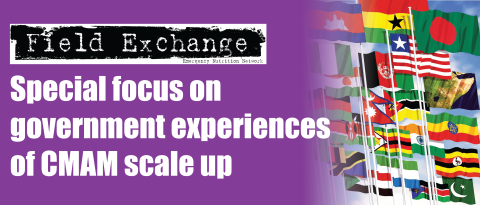CMAM Forum Update
Community-based management of acute malnutrition1 (CMAM) has been adopted by over 60 countries2 (as of December 2011), to help combat acute malnutrition in children under five years and reduce childhood mortality. The expansion of the CMAM approach into a variety of contexts, and the escalating demand to consolidate and share CMAM data and experiences, has created the need for a clear, accessible mechanism to facilitate information sharing. Many governments and other stakeholders share similar challenges regarding the quality of CMAM implementation and scale-up of services but are not always successful in capitalising on lessons learned within and among countries or agencies, making it difficult to move forward to achieve greater impact in a coordinated and effective manner. There has been a ‘patchwork’ of initiatives relating to information-sharing on the management of acute malnutrition, with no overall ‘umbrella’ initiative to bring these groups together and facilitate progress in a coherent manner.
In response to this need, a group of experts have collaborated in the creation of a CMAM Forum over the past year. The CMAM Forum aims to improve health outcomes of vulnerable populations through the provision of a robust information-sharing mechanism which expands the knowledge-base of management of acute malnutrition to help support implementation and monitoring of CMAM activities. CMAM Forum users are anticipated to be from a range of health and nutrition sectors with strong national representation. The Forum aims to be especially practical for those implementing programmes.
The CMAM Forum development has a phased approach where in Phase One, the working modalities were explored and foundations built and during Phase Two, the CMAM Forum activities are being rolled out (pending funding). Phase One started in September 2011 with funding from UNICEF and Action Contre la Faim France (ACF-F). Two co-facilitators, seconded from ACF-F and Valid International, were appointed to lead the activities. A steering committee has been established with technical experts3 to help guide activities.
A website has been developed and just launched at www.cmamforum.org. In addition to general resources, the website includes sections on training, advocacy and research and monthly ‘Technical Briefs’ to summarise current topics pertinent to CMAM. Wherever possible, the Forum will create linkages and improve access to relevant initiatives and resources, rather than duplicate them.
If you would like further information or to share any resources relevant to the management of acute malnutrition, please contact: cmamforum@gmail.com
1Community-Based Management of Acute Malnutrition (CMAM) includes community outreach for community involvement and early detection and referral of cases of acute malnutrition, and follow up of problem cases in their homes, management of severe acute malnutrition (SAM) in outpatient care for children 6-59 months with SAM without medical complications, the management of SAM in inpatient care for children 6-59 months with SAM and medical complications and children under 6 months with acute malnutrition, and the management of moderate acute malnutrition (MAM) for children 6-59 months. CMAM is also known as Integrated Management of Acute Malnutrition (IMAM) or Community-based Therapeutic Care (CTC).
2UNICEF Global SAM Treatment Update-2011, May 2012 Steering Committee members are from ACF-F, Concern Worldwide, Emergency Nutrition Network (ENN), Food and Agriculture Organisation (FAO), Food and Nutrition Technical Assistance II and III Projects (FANTA), IASC GNC, International Centre for Diarrhoeal Disease Research, Bangladesh (ICDDR,B), International Malnutrition Task Force (IMTF), Ministry of Health country representatives, Save the Children UK, UNICEF, United Nations Systems Standing Committee on Nutrition (UNSCN), Valid International, World Food Programme (WFP), World Health Organization (WHO).
Imported from FEX website


